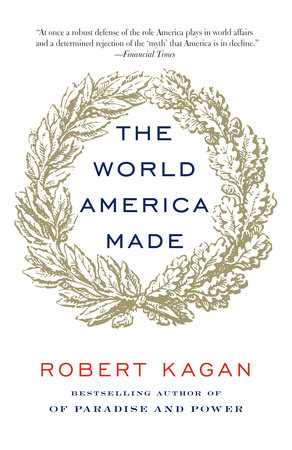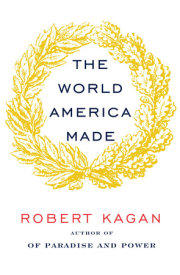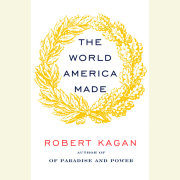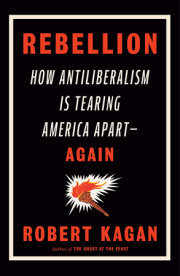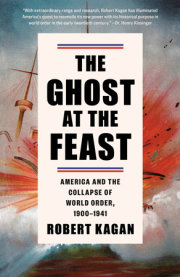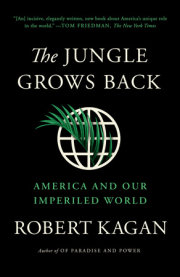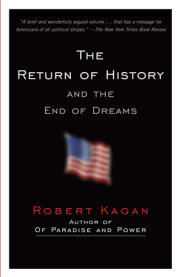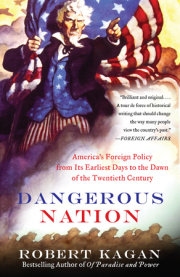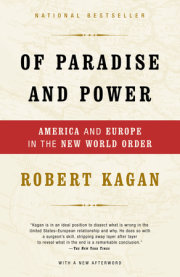Excerpted from the Introduction In the Frank Capra classic
It’s a Wonderful Life, George Bailey gets a chance to see what his world would have looked like had he never been born. It would be nice if we could do the same for the United States, to see what the world would have looked like had the United States not been the preeminent power shaping it for the past six decades, and to imagine what the world might look like if America were to decline, as so many nowadays predict.
We take a lot for granted about the way the world looks today—the widespread freedom, the unprecedented global prosperity (even despite the current economic crisis), and the absence of war among great powers. In 1941 there were only a dozen democracies in the world. Today there are over a hundred. For four centuries prior to 1950, global gross domestic product (GDP) rose by less than 1 percent a year. Since 1950 it has risen by an average of 4 percent a year, and billions of people have been lifted out of poverty. The first half of the twentieth century saw the two most destructive wars in the history of mankind, and in prior centuries war among great powers was almost constant. But for the past sixty years no great powers have gone to war with one another. Our era is best known for the war that never happened, between the United States and the Soviet Union.
There’s plenty wrong with our world, of course, but from the perspective of thousands of years of recorded history, in which war, despotism, and poverty have been the norm, and peace, democracy, and prosperity the rare exceptions, our own era has been a golden age.
Some believe this is the inevitable result of human progress, a combination of advancing science and technology, an increasingly global economy, strengthening international institutions, evolving “norms” of international behavior, and the gradual but inevitable triumph of liberal democracy over other forms of government—forces of change that transcend the actions of men and nations.
But there is also another possibility. Perhaps the progress we enjoy was not an inevitable evolution of the human species but rather the product of a unique and perhaps fleeting set of circumstances: a particular arrangement of power in the international system that favors a certain worldview over others. Maybe if those conditions were to change, if power were to shift, then the characteristics of the world order would change, too. Perhaps democracy has spread to over a hundred nations since 1950 not simply because people yearn for democracy but because the most powerful nation in the world since 1950 has been a democracy. Perhaps the stunning global economic growth of the past six decades reflects an economic order shaped by the world’s leading free-market economy. Perhaps the era of peace we have known has something to do with the enormous power wielded by one nation.
History shows that world orders, including our own, are transient. They rise and fall. And the institutions they erected, the beliefs that guided them, and the “norms” that shaped the relations among nations within them—they fall, too. Every international order in history has reflected the beliefs and interests of its strongest powers, and every international order has changed when power shifted to others with different beliefs and interests. On some occasions, the prevailing world order has simply collapsed into disorder. When the Roman Empire fell, the order it supported fell, too. Not just Roman government and law but an entire economic system stretching from northern Europe to North Africa was disrupted and would take centuries to rebuild. Culture, the arts, even progress in science and technology, were set back for centuries. People lost the recipe for cement.
We saw a similar collapse of world order in our own time. The world we know today was erected amid the chaos and destruction following World War II and the collapse of the European-dominated order that had evolved over four centuries. That order was far from perfect: it produced many wars, an aggressive imperialism, and the widespread oppression of nonwhite races, but it also produced the conditions for an era of great human advances. By the late nineteenth century British control of the seas and the balance of great powers on the European continent together had provided the relative security and stability to allow a growth in prosperity, a modest if tenuous expansion of personal freedoms, and a world knit closer by the revolutions in commerce and communication we today call globalization. It kept peace among the great powers for almost four decades after the Napoleonic Wars, and for another four decades after the wars of German unification. It was so successful that many concluded at the dawn of the twentieth century that mankind had reached a summit of evolution and that major war and tyranny had become obsolete.
Yet with the outbreak of World War I, the age of settled peace and advancing liberalism—of European civilization approaching its pinnacle—collapsed into an age of hyper-nationalism, despotism, and economic calamity. The once promising spread of democracy and liberalism halted and then reversed course, leaving a handful of outnumbered and besieged democracies living nervously in the shadow of their newly fascist and totalitarian neighbors. Suddenly it was a world filled with predatory leaders sitting atop predatory powers. The collapse of the British and European orders in the twentieth century did not produce a new dark age—though if Nazi Germany and imperial Japan had won the war, it might have—but the cataclysm it did produce was, in its own way, no less devastating.
Would the end of the present American order have less dire consequences? That is a question worth asking now, as so many contemplate the prospect of American decline. A surprising number of American intellectuals, politicians, and policy makers greet that prospect with equanimity. There is a general sense that the end of the era of American preeminence need not mean the end of the present liberal international order. The expectation, if not assumption, is that the good qualities of that order—the democracy, the prosperity, the peace among great powers—can transcend the decline of American power and influence. Even with diminished American power, the political scientist G. John Ikenberry writes, “the underlying foundations of the liberal international order will survive and thrive.”2 And there is an accompanying view that American decline is in any case already a fact of life, so whether it is a good thing or a bad thing, there is nothing we can do about it.
Against this backdrop, it is worth exploring to what degree the present world order depends on American power and its unique qualities. What would it mean for the future if the international order were no longer shaped primarily by the United States and like-minded allied nations? Who or what would take America’s place? And there is another set of questions, equally important: Is America really in decline? Or are Americans in danger of committing preemptive superpower suicide out of a misplaced fear of declining power?
Meet George Bailey: What is American About the American World Order?
Why call it the “American world order” at all? The United States has certainly not shaped the international environment by itself. Many other peoples, as well as broad historical forces—the evolution of science and technology, fluctuations in the availability of natural resources, long-term economic trends, population growth—have also created today’s world. Peoples on every continent have worked and suffered to lift themselves out of poverty and destruction and to make better lives for themselves and their children. The world is too big for any nation to shape by itself. Nevertheless, in any given historical period, the most powerful nations do put their own particular stamp on the international order, if only by virtue of their relative weight in the system. They establish many of the “norms” and rules of international behavior. They shape the nature of economic relations. They can even have influence in the realm of ideas and beliefs, including the way peoples worship their gods and the forms of government they consider legitimate. For many centuries the predominant power of China shaped the way millions of people throughout Asia thought, spoke, worshipped, painted, and carried on their commerce. In the nineteenth century, the great European powers imposed standards of international and domestic behavior not only for Europeans but for millions throughout Africa, Asia, and Latin America. There has been an Egyptian order, a Roman order, a Greek order, an Islamic order, a Mogul order, an Ottoman order, and many others, and historians will undoubtedly view the period from the end of World War II until some yet to be determined moment as an American order.
Yet it has also been the American order in a more specific sense. It is not just that the United States has been the most influential power in the international system. The most important features of today’s world—the great spread of democracy, the prosperity, the prolonged great-power peace—have depended directly and indirectly on power and influence exercised by the United States. No other power could have or would have influenced the world the way Americans have because no other nation shares, or has ever shared, their peculiar combination of qualities.
Some of the most important qualities are obvious. America’s unique geographical circumstances, its capitalist economic system, its democratic form of government, and its enormous military power have together shaped a particular kind of international order that would have looked very different had another nation with different characteristics wielded a similar amount of influence.
Less easy to grasp, but just as important to understanding the nature of the American world order, is the complex character of the American people. This is no simple paean to Americans’ superior virtues. Some portray Americans as farseeing builders of international institutions and structures of liberal order, as thoughtful “operators” and “managers” of vast global systems.3 But few Americans, and few non-Americans, would recognize this portrait. In most respects, Americans are like any other people, with a blend of selfishness and generosity. More than most, they have been a people of contradictory impulses and a most ambivalent view of what role, if any, they ought to play in the world.
They are a people rife with potent national myths that both inspire and mislead them. Start with the fact that one of the most powerful, influential, and expansive peoples in history still think of themselves as aloof, passive, self-contained, and generally inclined to minding their own business. In less than two centuries Americans transformed their nation from a sliver of settlement clinging to a coastline into a globe-girdling superpower with historically unparalleled power and influence. Yet to hear Americans tell it, they are the Greta Garbo of nations: they just want to be left alone. In their national mythology, the two-centuries-long subjugation of the North American continent, a region inhabited by Spaniards, French, and Russians, as well as by an entire race of indigenous peoples, was not conquest but the peaceful settlement of an empty frontier. Americans do not go “abroad in search of monsters to destroy” is the oft-quoted phrase of John Quincy Adams. If someone points out to them that they have, indeed, often done just that, then they portray themselves as the “reluctant sheriff,” their boots on the desk, reading the newspaper until some unsavory gang rides into town and forces them to pull their rifle off its rack, whether Japanese imperialists, Nazis, Soviet communists, or Islamic jihadis. “The United States of America never goes to war because we want to,” said one prominent politician a few years ago. “We only go to war because we have to.”
But this self-perception, while sincere, bears no relation to reality. Since the late nineteenth century, when the United States became a world power, Americans have used force dozens of times, and rarely because they had no choice.5 They have sent troops to Mexico and Central America to depose troublesome leaders; they have fought the Spanish in Cuba and independence-minded guerrillas in the Philippines; they have fought anti-Western forces in China and communists in Vietnam and Korea, and have sent millions of troops to Europe, twice; they have fought dictators and jihadis in the Middle East, Central Asia, and Africa. And they have done so for many reasons: to defend themselves from distant threats, to preserve economic interests, to protect peoples from slaughter, to resist aggression, to fight tyranny, to support democracy. Far more than any other democratic people in the world today, Americans see war as a legitimate, even essential, tool of foreign policy.6 Few modern nations, and no modern democracies, more revere their military heroes, both past and present. But every time they go to war, Americans promise themselves they’ll never do it again.
They are even ambivalent about the cause of democracy, with which they have always been so closely identified. Americans, even in Woodrow Wilson’s day, never had a master plan for making the world over in their image. They have often ignored the dictators in their midst, allied with them, aided them, and done business with them. They are not missionaries. But neither have they been able to escape their democratic identity, their democratic conscience, and their conviction that their special cause is, as Ben Franklin said, the “cause of all mankind.” To be an American is to believe in and be committed to what Americans, and only Americans, like to call “our way of life.” Since they believe their founding principles are universal, they measure all other peoples against the same rigid standard. This highly ideological view of the world tells them that all nondemocratic governments are inherently illegitimate and therefore transient. Even John Quincy Adams, in the same speech in which he warned against seeking monsters to destroy, urged the peoples of Europe to follow the American example and mount revolutions against centuries-old monarchies: “Go thou and do likewise!”
Copyright © 2013 by Robert Kagan. All rights reserved. No part of this excerpt may be reproduced or reprinted without permission in writing from the publisher.

